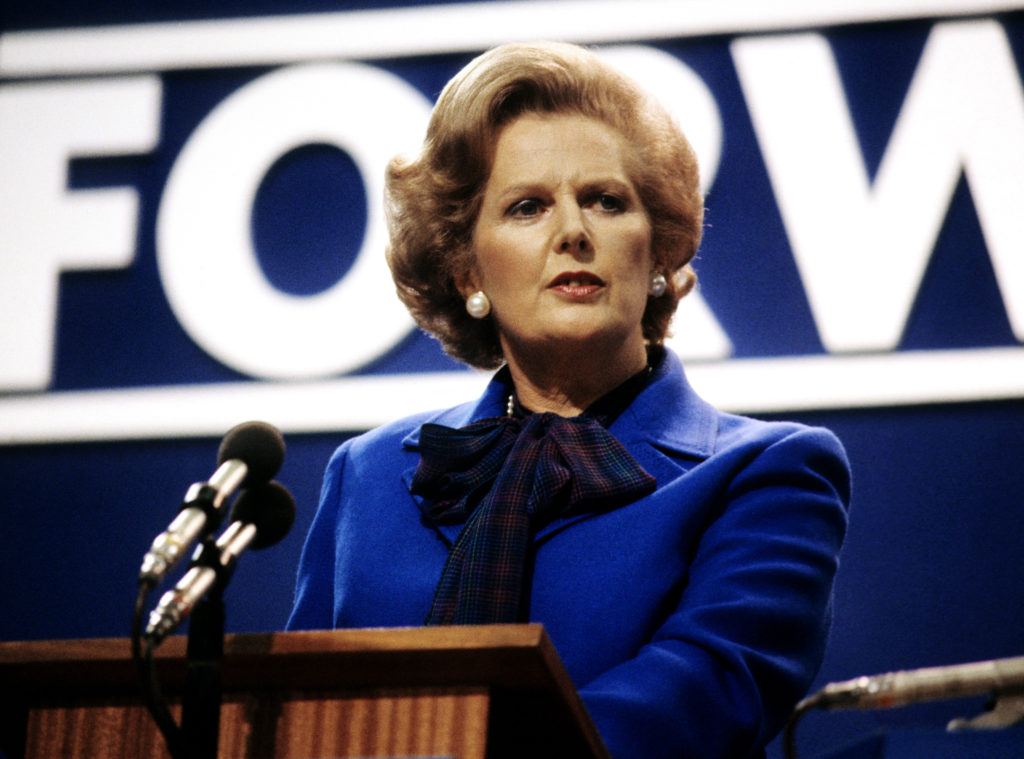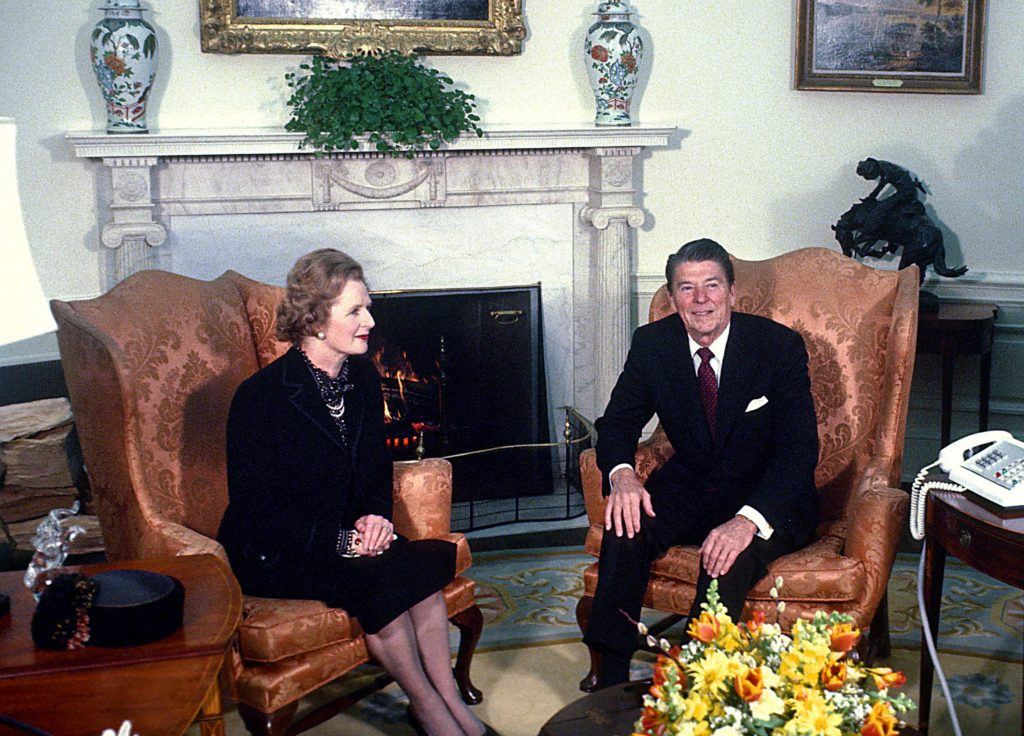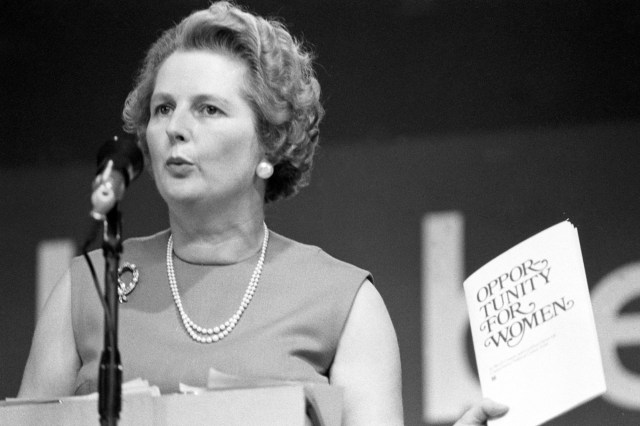‘HOW COULD ANYONE LEAD THE CONSERVATIVE PARTY WITH A VOICE THAT SOUNDED LIKE BROKEN GLASS?’ Credit: PA IMAGES

Along a narrow corridor behind the Speaker’s chair in the House of Commons, in a part of the building closed to visitors, a door opens onto a staircase leading to the rooms that the Prime Minister uses as his or her parliamentary base. The suite at the far end of the corridor is traditionally allocated to the opposition. In 1987, when working for the Labour Party, I had left Neil Kinnock’s office and was heading towards the debating chamber when my way was barred in that narrow corridor by a small, sinewy woman, whose face was oddly familiar. Most of the women working on the parliamentary estate in those days were support staff who deferred to the professionals and kept out of their way, but this one stood her ground. If I had been better tuned to the rhythms of parliamentary life, I might have noted that it was that time in the afternoon on a Tuesday or Thursday when the 15-minute ritual of Prime Minister’s Questions ended. Its participants were dispersing. The person blocking my way was Margaret Thatcher.
It took a moment to process this startling fact. She noted my astonishment, which seemed to amuse her, and with a half-smile she raised a finger and swept it from side to side, as if in imitation of a car’s widescreen wiper. The gesture was telling me that I was going to make way for her, but I could choose which way to stand aside. I pressed myself against the wall to the left as she swept by.
Lady Thatcher was a one-off. In public, she could be strident, righteous, humourless, and sometimes shockingly indifferent to the consequences of her government’s actions. In 1980, I was invited by the Workers’ Educational Association to Consett, in county Durham, to give a talk to steelworkers who were using their free time to make up some of what they had lost by leaving school at 14. About a week after that interesting day every member of that audience was thrown out of work. The Consett steelworks was breaking even, but the newly appointed head of British Steel, Ian MacGregor – the same man who would later lay waste to Britain’s mining communities – decided that its ratio of profitability to running costs was inadequate. In that small town, built around its steel works, 4,700 jobs were destroyed by the distant Mr MacGregor. The unemployment rate rose above 50 per cent. Mrs Thatcher was challenged during a subsequent visit to the North East of England about the region’s shocking unemployment, to which her government had so casually contributed, and replied that complaining would only discourage private investment. “Standing there as moaning minnies – stop it!” she said.
And yet, in private, she was curiously engaging. Some politicians hold strident views in public to conceal a private feeling of inadequacy, but that was in no way true of Mrs Thatcher. She was confident to the core, and utterly convinced of the rightness of her beliefs, which meant that she had no fear of journalists. She was the last Prime Minister who would mingle with journalists without a spin doctor standing guard.
The public became aware during the Tony Blair years that prime ministers are constantly protected by a phalanx of spin doctors from uncontrolled contact with the media. This was actually already happening before 1997. I once succeeded during a trip to Moscow in getting into conversation with John Major. I tried to prompt him to say something unguarded by telling him that the newspaper I was working for, The Observer, was interested in the phenomenon of journalists who were also political activists, knowing that this was one of his bugbears. “Oh, I can you tell stories about that!” Major exclaimed. But a voice interjected: “Yes, but you’re not going to, are you, Prime Minister?” A civil servant, Jonathan Haslam, was listening. John Major obediently shut up.
During the short time when I came into Margaret Thatcher’s orbit, in the last couple of years of her premiership, no civil servant or adviser would have spoken to her like that. The first time that I was on a foreign trip travelling in the prime minister’s plane, the journalists aboard were called forward in groups of four to talk to her on whatever topic they chose. She made some comment about relations with Europe, whereupon the Political Editor of the Daily Mail, Gordon Greig, laughed in her face sand said: “Does Geoffrey Howe agree with that?” It was an open secret then that her relations with Sir Geoffrey Howe, the Deputy Prime Minister, were close to breaking point.

She seemed to be fond of Greig, who was a veteran of the Lobby. He had been the first to hear a rumour in 1975 that she might challenge Edward Heath for the Conservative leadership. He shared this speculation with the Mail’s Editor, David English, who was not wholly impressed by the thought of a woman taking charge. “How can anyone lead the Conservative Party with a voice that sounds like breaking glass?” he wanted to know. He ordered Greig to put that question to the lady.
It was Sunday. As Greig later described it, the entire wide newsroom floor in the Mail’s Kensington office fell silent as he rang the Thatcher household and asked Denis to call Margaret to the phone. In a short interview, she said enough to satisfy Greig that she did indeed have her sights on the leadership. So, dutifully, he asked her how she could hope to lead the Conservative Party with a voice like breaking glass. Down the line there came a loud noise, a high pitched cry of surprise and outrage. Greig said that it did sound very like breaking glass.
He was forgiven his impertinence. She took voice training, and treated Greig with affectionate respect. When he taunted her about her deteriorating relationship with Sir Geoffrey Howe, she jabbed his lapel with her index finger and told him: “Rearrange your ideas, Gordon!”
A trio of Downing Street officials, including her Press Secretary, Bernard Ingham, were listening to this exchange, but they stood at the back and at no point did they attempt to interrupt or steer the conversation away from the dangerous subject of the rift in her Cabinet. She seemed completely at ease – far more than I was – and visibly enjoying being the centre of attention. It was like a verbal sparring match with a flirtatious granny. I noted that much effort and expense had gone into removing the signs of ageing from her face, but not from her wrinkled neck. Her neck looked ten years older than her face.
Everywhere in the world, she was renowned as the Iron Lady who went to war over the Falklands. In Tokyo, I watched from the back of a classroom full of Japanese girls aged around 13 or 14, who were bristling with excitement that exploded into screams of recognition when Margaret Thatcher entered the room. It was the sort of reception that a rock star would hope for. A year later, she visited an Armenian town, Leninakan, which had been being rebuilt after a catastrophic earthquake. It was reported that the crowd that turned out to see her was twice Leninakan’s normal population, as people poured in from all across Armenia. It seemed that every square foot of public space was filled by the surging crowd. People were waving from windows and standing on the roofs. The crush was such that all the available officials, British or Soviet, had to link arms to avoid the risk of her being trampled. I saw that old Cold Warrior, Bernard Ingham, arm in arm with a man wearing the insignia of a KGB officer.
People who live in that kind of constant exposure are likely to pass through a portal beyond which it becomes impossible for them to hold a normal conversation. They become so used to being observed that everyone they meet is an audience to be addressed in a series of declarations. It is a tribute to Margaret Thatcher’s character that even after so long in the public eye, she could still listen and talk, even to some journalist she barely knew who happened to be in her eyeline.

On the return journey from Japan, her plane stopped off to refuel in Bratsk, in Siberia, the place of exile to which Stalin’s immediate successor, Georgi Malenkov, was dispatched to manage a hydro-electric power station after being ousted by Nikita Khrushchev. As a courtesy, Mrs Thatcher had to disembark and be taken to a building that I assume was Bratsk town hall, to meet the Mayor. We were taken along, and waited in an adjoining room, where there was a television screen tuned to Sky, which was broadcasting a video of Elton John singing I’m Still Standing. Satellite television was in its infancy then. It was a revelation to me that it was technologically possible for a video to be watched simultaneously in the UK and in a town 5,000 miles east of London.
The formalities in the next room came to end, an adjoining door opened, and Margaret Thatcher wandered through, alone. Any other Prime Minister might have looked around for a civil servant or special adviser to pay court, but she saw me, and apparently decided that I would be more interesting company than the Mayor of Bratsk. Not a high hurdle. When I asked how the meeting had gone, the answer was a slight raising of the eyes to the ceiling. When I asked if Sky was available in the room where she had met the Mayor, she confirmed that it was. “Did you get the Elton John video?” I asked.
That set her off. In the Mayor’s office, Sky News was reporting live from the Green Party annual conference, which seemed to have held her attention more than anything than the Mayor had to say. She had heard a leading Green allege that there was litter on British streets. An irate Mrs Thatcher informed me that there was no litter on British streets – though how she knew, I could not say – and that the offending Green activist should not be saying such a thing to a worldwide audience. At that point, we were interrupted.
Sometimes, I am asked what it was like to be talking casually with Margaret Thatcher. The answer, usually, was that it was like a high pressure day at work. I was usually too anxious not to miss a story, or say anything foolish, or be shown up in front of other journalists to reflect on what was taking place. The experience that seemed oddest when it happened was actually mundane. Journalists were expected to report for the prime minister’s flight an hour before take-off, but one time a serious traffic jam held me up and I was only just in time. Downing Street staff had collected the passports off all the other journalists, so I was told to go to a side room in Heathrow’s VIP suite to add mine to the appropriate pile. On a table, beneath a very large 1950s portrait of the Queen, were two piles of passports – one, I deduced, for the members of the official party, the other for journalists. Not knowing which was which, I picked up the one on the top of the nearer pile, opened it, and was taken aback to come upon a flattering photograph of Margaret Thatcher, alongside the information that she was a British citizen, born on 13 October 1925, and her passport number. It had never occurred that she, too, might need a passport. What if it were forgetfully left behind? Would they refuse to let her in? I would have loved to have stolen this item as a memento, but common sense told me to put it back where I found it.
There was another occasion when we were travelling when I was able to talk to her for a moment when no one else was listening. I suggested that the newly elected US President, George Bush, as a former head of the CIA, would be better informed about world affairs than his predecessor. She did not like that. It was an implied slight on her beloved Ronald Reagan. She shook her head, and replied: “But with Ron, it all came from the heart.” The way that she said ‘Ron’ suddenly brought to me that I was talking to someone who did not just read about US Presidents and watch them on screen. ‘Ron’ really was someone she knew well.
In the summer of 1989, Mrs Thatcher came to a social event organised by Lobby journalists, in a room high up in the Commons overlooking the Thames. She stayed almost until the party broke up. She was there for so long that I left before she did. At the door, I looked back and saw her engrossed in conversation with two journalists, who were presumably the last she spoke to. Had there been an adviser or civil servant watching out for her, she would have been quickly steered towards the exit rather than engage with these two.
One was a woman who had recently joined the parliamentary Lobby as the Political Editor of a tabloid called the Sunday Sport, recently launched by the pornographer David Sullivan. That publication’s speciality was revelations such as ‘Aliens Turned my Son into an Onion’, or ‘Adolf Hitler was a Woman.’ (In the latter example, to avoid confusion, the opening paragraph specified that this was a story about a German dictator called Adolf Hitler, not anyone else by that name). The decision to allow Sunday Sport to hold a parliamentary lobby pass was a mistake, which was later put right.
The person at Margaret Thatcher’s other side was a very different character, a serious, long-serving reporter named Mike Ambrose, Political Editor of the communist newspaper, the Morning Star, which in those days was displayed on more newsstands in the Soviet Union than in the UK.
Imagine that in an unguarded moment, Mrs Thatcher had let slip a government secret. If it had turned up exclusively in the Sunday Sport and Morning Star, would anyone have believed that it came from a credible source? Perhaps there was an insight into the Prime Minister’s thinking in the Morning Star, which we all ignored, not thinking a communist might have spoken directly to the Iron Lady. And can anyone imagine that any Prime Minister since Margaret Thatcher could have been spotted in such company, with no protective spin doctor at hand?










Join the discussion
Join like minded readers that support our journalism by becoming a paid subscriber
To join the discussion in the comments, become a paid subscriber.
Join like minded readers that support our journalism, read unlimited articles and enjoy other subscriber-only benefits.
Subscribe